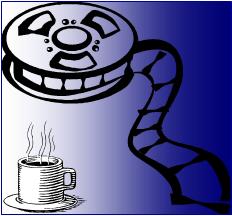

|
 |
Gilda
|
Please go to the new Coffee Coaster site implemented more gracefully in Wordpress. This page: http://brianrwright.com/CoffeeCoasterBlog/?p=5071 |
Rita Hayworth Gilda Mundson Farrell
Glenn Ford Johnny Farrell
George Macready Ballin Mundson
Joseph Calleia Det. Maurice Obregon
Steven Geray Uncle Pio
Joe Sawyer Casey
Gerald Mohr Capt. Delgado
Gilda: You do hate me, don't you, Johnny?
Johnny Farrell: I don't think you have any idea of how much.
Gilda: Hate is a very exciting emotion. Haven't you noticed? Very exciting. I hate you too, Johnny. I hate you so much I think I'm going to die from it. Darling...
[they kiss passionately]
Gilda: I think I'm going to die from it.
Another review from the classics department, not that I'm stuck in the past by any means. It's simply that some serendipity struck recently on my review of The Great Waltz (1938) which I "penned" about a year ago: Turner Classic Movies showed The Great Waltz during prime time, and all of a sudden my site traffic took a jump... particularly to that review page. Sure enough, not as many reviews exist for some of the oldies, so my review of Waltz shows up on the first page of Google and the second page of Bing. So I was thinking, why not review a few more of these golden old ones?
Last week I reviewed An Affair to Remember (1957), but I don't really expect any great influx of traffic should Robert Osborne regale the film on Turner with his unique reminiscences. For one thing, Affair is far too popular, and more than a handful of reviews are out there from more widely read professionals than Mr. Coffee Coaster. No doubt the same is true of Gilda (1946), but who knows? I do know that someone(s) dear to me put some review-like commentary together and submitted it to this Reason to Freedom location a few year's back:
"When the war ended, millions of troops came home, and the jobs in the defense plants changed back to manufacturing peacetime goods. Rationing stopped. Women who had worked outside the home to support the war and provide for their families were expected to stay home now, raise families again, and let the veterans have the jobs. They were not, however, the naïve, dependent homemakers that they had been before the war. They had functioned independently outside the home, raised their children, and kept house as well for about four years..."
... thus this main reviewer suggests the movie reveals the radically changing world for both men and women post WW2, kind of a film noir version of the wartime film, Casablanca.
The other reviewer comments that Gilda has so many similar components to the Humphrey Bogart-Ingrid Bergman classic—"Both films take place largely in gambling casinos in exotic countries. Both involve love triangles (two men, one woman). Both films include a head police official who plans to make an expected arrest at the casino. Both films include a dance scene. The police official in both films ultimately covers up the murder of the antagonist, and at the end, closes up the casino."—that it's more a ripoff of Casablanca than an homage.
But for me the noir of Gilda overwhelms the passion and romance that anyone may have wanted to duplicate from Casablanca. This is such a dark tale—especially for the immediate years following the Big War (when with few exceptions the message was "get over it[1], don't think about it, and rush like lemmings into blissful suburbia")—that studio executives must have been excreting coffee saucers, worried about box office.
Maybe someone can email me or comment on my blog on where to find box office and financial returns for movies—that would be very nice-to-have information for all my review work—but I'm pretty sure Gilda was a huge success right out of the chute. Not hard to figure out why. Two words: Rita Hayworth. Not only was she an established romantic starlet from such hits as You'll Never Get Rich (her breakout movie via splendid dancing with Fred Astaire) and the Cover Girl (1944) (which won a Best Music Oscar), she was a lead pinup girl for American flyers and servicemen in WW2... number 2 after Betty Grable.
Rita Hayworth was the Marilyn Monroe of her moment in time, and in 1946, even if she wandered onto a movie set in a parka and snow shoes, the film would be a major success. And in Gilda she sings—tho the DVD extras tell us her songs are dubbed—and dances up a storm. And she looks totally primetime. And Glenn Ford (Johnny Farrell) was at the top of his Hollywood game in those days, too. So people would look at the bill and the poster and pack the theaters.
Still I wonder what my parents' generation was thinking 15 minutes into the film. It's black and white in spades. Johnny is down on his luck in Buenos Aires, playing dice on the streets. He gets in trouble, then an elegantly dressed man with a special knife gives him a hand; it's none other than Ballin Mundson (George Macready), a German expatriate who runs the most exclusive night club in the city, if not the country. His lovely new wife, Gilda (Rita Hayworth), is the star attraction.
It isn't clear whether Mundson knows anything about Farrell when he helps him out, but he must have seen something or picked up an understanding of what makes Johnny tick from something in the conversation. Anyway, Mundson tells Johnny about his nightclub/casino and asks him to come by to check it out. After they meet up there, it's clear the two of them have the same general sense of life: there's a sucker born every minute, and it takes a cheat to catch a cheat. So Farrell comes to work for Mundson... which puts him in proximity to the lovely and talented Gilda.
And he knows her. She knows him, too. From the past, but I'll leave the details out of this, because their past is a key to the plot and to their future. From the gitgo, Johnny and Gilda are at each other's throats... and as you're watching them, you wonder, "Hey, what's the deal, here?" I've never seen a movie in which the romantic leads announce that they hate each other so often. [And frankly, I consider the dialog in those scenes—and throughout the movie for that matter—fairly sophomoric even by 1940s standards.]
But, if you can discount the childish banter and Johnny's and Gilda's obviously false protestations of intensely disliking each other, you'll pick up on some seriously sexual hot undercurrents—something decidedly racy for the 1940s. And in that department, Hayworth and Ford are completely convincing, particularly Rita, who gets to entertain us as well. What a babe! And seductive to boot:
Gilda: If I'd been a ranch they'd have named me the Bar Nothing.
So much so, that I have to believe this movie role added to the burden Ms. Hayworth had to carry throughout the remainder of her life and career... I actually feel sad for people stuck with the fame and physical beauty syndrome. How do you maintain the illusion forever?
So... what's with the plot? Is what the second reviewer above had to say true? Is Gilda Casablanca on a dark day? Well, I don't think so. It doesn't take a genius to see that, although the settings and character types are similar in many ways, the manner in which they're arranged is wholly distinct. Gilda is post war and shows how so many men and women, high and low, from far and wide (particularly the German big-business types who, seeing the handwriting of defeat on the wall, flocked to Argentina before war's end to keep their bank accounts intact.)
Gilda plays with the motivations of the characters in ways that Casablanca never needs to; the protagonists are all devious in one way or another. Like most people, they're seeking to bury the past and build something new. Starting over. And then love does take a turn. On the route to the finish we witness another sterling quality in the film that the black and white format can obscure at first glance: glamour.
So what's with all the talk about hate? Anyway, a fine effort and a unique contribution to the cinema arts... also full of deep significance to many of the Greatest Generation.
[1] That damned conflict took a lot of forgettin', with something like 60 million killed, 400,000+ Americans, and I couldn't find the number of injuries. Probably a million of the 12 million American men who went over there either didn't come back or didn't come back in one piece.
###
2010 February 11
Copyright © Brian Wright | The Coffee Coaster™
Gilda | Rita Hayworth | Glenn Ford | Film Noir |
Germans in Argentina
 |
 |
|||
| |